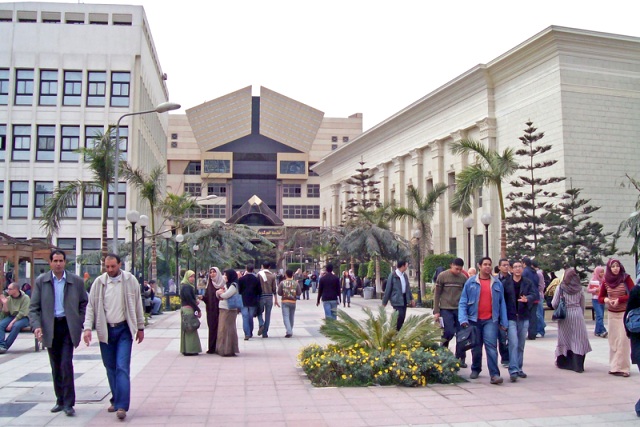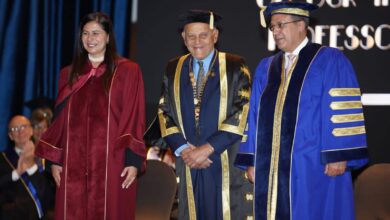Higher Education Reform in Post-Revolution Egypt by Anthony J. Perzigian, PhD, Board of Trustees Chair Adviser, Future University in Egypt, and Provost and Professor Emeritus, University of Cincinnati (USA)
Since the first of January 2011, I have had the great honor and privilege of serving as Board of Trustees Chair Adviser for Quality Assurance & Academic Affairs at the Future University in Egypt (FUE). Chairman Khaled Azazy recruited me from the University of Cincinnati (USA) where I had served as professor of anthropology from 1970 to 2010 and also served as Senior Vice President for Academic Affairs and Provost for 14 years. Now more than two years after my arrival in Egypt, I am taking this occasion to suggest ways to reform and improve Egyptian higher education. Without reforms and without greater funding, higher education will not achieve its potential as an engine of economic development. With the burgeoning youth population (55% of the population under 25), the stakes could not be higher. Egypt’s youth powered the 25 January Revolution, and it is they who will inherit the responsibility of leading Egypt. Unfortunately, without reforms, Egypt’s educational system will not fulfill its role in producing effective leaders in business, science, education and politics. The time for reform and heightened investment is now, and Egypt’s economic future hangs in the balance.
The task of reforming and revitalizing Egypt’s higher education system will not be easy. The nation faces daunting economic and political challenges following the crippling effects of 60 years of autocratic dictatorship. Moreover, one cannot ignore Egypt’s other urgent priorities (e.g. rebuilding infrastructure, defense, subsidies, health care, energy) that also compete for resources and require greater investment. But the case must be made that Egypt’s future depends on the development of its human capital through education. Without that development, Egypt’s capacity to compete in the global arena will continue to suffer, and we will witness Egypt’s further economic slide, diminished influence in the Arab world, and festering disenfranchisement and alienation among youth. Thus one can make the case that education must be among the government’s highest funding priorities. Without heightened investment along with much-needed reforms, universities will continue to be grotesquely overcrowded places (265,000 students attend Cairo University) distinguished by strained, antiquated facilities, overworked staff, and outdated curricula.
This article emphasizes that much can be reformed and improved without huge infusions of new monies. We will illustrate by examining the curriculum, the teaching methods, and the higher education system itself. Let’s start by asking why change the curriculum? The answer is simple. Today’s university curricula are failing to adequately prepare Egyptian youth for meaningful employment and productive careers in the every-changing global workplace. Indeed, many commentators as well as surveyed employers commonly lament the poor preparation of today’s university graduates who studied curricula that do not match the needs of the economy and rapidly-changing labor market. Making the point that Egypt’s students are poorly prepared, OECD’s Secretary General Angel Gurria recently observed that 600,000 job vacancies went unfilled in 2012. This reveals that the linkage between Egyptian higher education and the needs of the modern labor market is tenuous at best. Egyptian higher education should take immediate steps to prepare its students for the demands of an ever-changing labor market.
Because change is inevitable and because we have no crystal ball telling us the specific job requirements of the future, higher education must therefore prepare its youth to be adaptable to evitable change. That means equipping our students with a strong knowledge base and the intellectual skills necessary for nimble, effective adaptation to change. This can be accomplished if universities strengthen (or in some cases introduce) a general education (gen ed) requirement for all first year undergraduate students. The gen ed component should constitute no less than 25% of all bachelor’s degree programs and include more compulsory work in the natural sciences, social sciences and humanities. Higher education means more than one’s concentrated study in a specialized field of study or major; instead, higher education means non-trivial exposure to all branches of knowledge and human inquiry. Let me provide an illustration from my former institution. As provost at the University of Cincinnati (USA), I once calculated the percentage of credit hours in the major that were required to graduate from our eminently-successful 5-year engineering programs; it was only 49% with the remainder in other fields of study. Of note, Cincinnati engineering graduates excel in their careers because of (not in spite of) receiving a well-rounded, gen-ed grounded education. In contrast, I estimate that for Egyptian programs, work in the major constitutes 90% or more of the credit hours. To introduce an effective gen ed program in Egypt will mean adjusting requirements by lessening the number of credit hours in the major. Judging from the lesson of the University of Cincinnati, this will only redound to the professional success of students in all fields of endeavor especially in today’s rapidly changing world.
The gen ed component can also hone critically-important competencies vital for success in all fields of endeavor. To accomplish this at FUE, we, like the University of Cincinnati, embed in our curricula what we call the ‘four pillars”. They are: critical thinking, knowledge integration, effective communication, and social responsibility. These competencies together with information literacy and quantitative/scientific reasoning are exactly what today’s employers are seeking.
In addition to introducing or expanding their gen ed programs, Egyptian universities can take additional steps to prepare students for competition in today’s increasingly interdependent, interconnected global workplace. To this end, Egyptian universities must modify their programs to include cross-cultural perspectives and awareness. This will mean different approaches for different disciplines, but all students upon graduation should be prepared to navigate seamlessly across time zones and to work effectively across culture. Today’s interconnected world places a high premium on cross-cultural literacy and international cooperation. Promotion of cross cultural competencies and literacy should be a common thread throughout the academic fabric of all universities. To this end as well, universities should embrace and encourage 2nd or even 3rd language acquisition.
Finally, we offer the recommendation to expand entrepreneurism education in Egyptian universities. This should be an urgent national priority in light of a recent study of 38 countries that found Egypt ranked last in the percentage of adults with suitable training in how to start a business or to take an idea from the lab to a commercialized product or service. Development of entrepreneurism studies also has the added benefit of fostering healthy cross-disciplinary collaboration across faculties, collaboration that is relatively uncommon in today’s Egyptian universities.
To effectively reform if not transform Egyptian education requires more than modernization of the curriculum. It also requires radically different approaches to teaching or pedagogy. But why change the tried and true methods of teaching today dominated by lecturing? Again, the answer is simple. The intended learning outcomes of today’s teaching methods often fail to prepare our youth for the modern work place which is constantly changing. As is the case in primary and secondary schools, far too much university instruction is lecture-based and, as a result, focused primarily on the delivery, the robotic memorization, and regurgitation of information the instructor deems important. Today’s lecture-dominated classrooms (sometimes seating 1000 or more students) are failing to develop the critical thinking and intellectual skills necessary if our students are to drive economic development and innovation. Passive, lecture-based learning does not prepare graduates who are able to apply knowledge and solve problems, skills critical in the modern world. Egypt’s classrooms must focus on cultivating critical thinking and rational thought that encourage innovation, creativity, and, ultimately, economic development.
From my own career as a professor, I know that it is very easy and convenient to rely year-after-year upon one’s lecture notes. I will confess that a certain amount of inertia and resistance to change sets in. When the ease and convenience of the professor is paramount, student learning will surely suffer. We call upon the educational establishment….ministers, administrators and professors….to transform Egypt’s teaching and learning environment. Let’s escape from the tyrannical hold that lecturing has in Egyptian education and embrace, instead, active learning pedagogies well known to enhance student learning both inside and outside of the classroom. Outside of the classroom, we can provide real-world opportunities through unpaid internships. Or, we can create opportunities for undergraduate research (as part of course requirements or, for example, in a professor’s lab). Another device made world famous at the University of Cincinnati is cooperative education where students alternate semesters of study and paid work. Such methods of experiential learning not only enhance learning but also prepare students for the workforce. Another powerful tool for experiential learning is education abroad whether for a semester or even a summer. Finally, the classroom experienced can be enriched and the delivery of the curriculum modernized through innovative uses of online resources and through innovative assignments requiring problem-based learning that requires students to use knowledge, not just recite it. Making these changes requires more effort by the teacher or the professor, but the reward in terms of student learning and intellectual development will prepare students for productive roles in the modern world.
We have now discussed ways of reforming both what and how we teach in Egyptian universities. But why change the overall higher education system? Again, the answer is simple. It will be much easier and more effective to modernize the curriculum and to change our approaches to teaching and learning if universities are free and unshackled to do so. This means democratizing and liberating Egypt’s higher education system.
The current system, a pre-Revolution product of an era of autocratic dictatorship, is too centralized and overly dominated by rigid governmental control. As a consequence, universities have limited opportunities or incentives to innovate; they have limited independence to respond to new market demands, to introduce new curricula or to internationalize their programs. Under the yoke of ministerial jurisdiction, universities….both public and private….are micro-managed to the extreme including selection of students as well as appointment and promotions of their own academic staff.
Any progressive reform of Egyptian universities must allow institutions more academic freedom, greater responsibility, and wider discretion in conducting their affairs. Simply stated, universities must be granted greater autonomy. This also means greater internal autonomy and democracy within universities where staff and students have more say in institutional affairs. Through greater self-management and autonomy, institutions can become more internally-accountable, more responsive to societal/market demands, more student-centered, and more singularly-committed to common goals and objectives. It will also encourage universities to more effectively police and eliminate internal corruption as recently detailed in the Daily News Egypt (13 February 2013). All of this will require a sea change in the culture and management of Egyptian universities, but such changes would reap great rewards.
Before concluding this critique of the higher system, it must be mentioned that enrollment in Egyptian universities as well as Arab universities is heavily skewed to the humanities and social sciences. Only approximately 20% of students are studying in the so-called STEM disciplines: science, technology, engineering, mathematics and medicine. Moreover, there is a serious underrepresentation of females. To be more globally-competitive in a high-tech world driven by scientific innovation, Egypt must attach a national priority to increasing the number of STEM students as well as the proportion of females. This, of course, will require major improvements in the quality of pre-college education in Egypt. And it will also require a major re-thinking and reform of the current university admission system now under the severely-limiting constraints of the thanaweya amma which measures rote memorization. Egypt must devise a more sensible, flexible and thoughtful system, a system that opens more doors than it closes to students aspiring to study in the STEM and other disciplines. If we can reform the system by allowing universities more discretion and control of student admissions and by allowing students more choice in what and where they study, Egypt can increase the number of STEM students. This will redound to the success of the nation and a more viable economy.
In closing, by implementing the reforms recommended in this article, the higher education system can better prepare youth for competition in the global economy. The talent is there. Indeed, Egypt possesses a great wealth of talent. It needs only to unleash that potential through a more effective educational system. The imperative to do so is now upon us.




